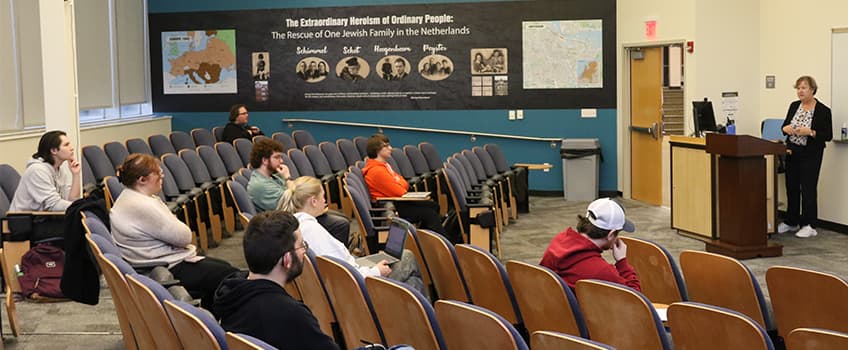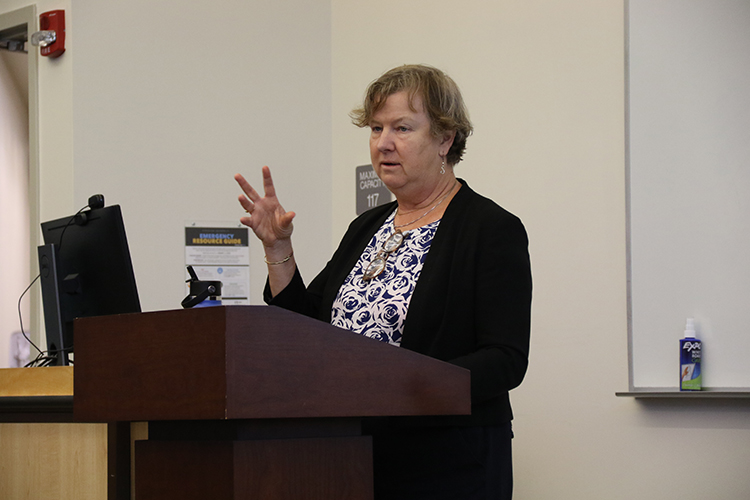Holocaust Resource Center Creates Visiting Scholar Program

Dienke Hondius, an Associate Professor of History at Vrije Universiteit Amsterdam and staff member at the Anne Frank House, speaks to a Holocaust and Genocide Studies class at Stockton.
Galloway, N.J. — The last time Dienke Hondius spent considerable time at Stockton University as a Visiting Professor of Holocaust Studies in 2020, the pandemic forced her to go home to the Netherlands early.
This fall, the Associate Professor of History at Vrije Universiteit Amsterdam and staff member at the Anne Frank House has returned to create a new visiting scholar program at the Sara and Sam Schoffer Holocaust Resource Center (HRC).

Dienke Hondius is the keynote speaker at the Sara and Sam Schoffer's annual Kristallnacht Lecture on Nov. 6.
This essential program will analyze the critical early warning signs of rising Nazism and fascism across Europe during World War II and new research about the Frank family and their helpers in Amsterdam. Hondius will also explore the vital importance of early awareness, resilience and education as fundamental lessons from the Holocaust. This program is free and open to the public.
“Dienke is one of the most prominent Dutch scholars of the Holocaust and also on the experiences of the Frank family and others hiding in the Secret Annex,” said HRC Director Irvin Moreno-Rodriguez.
Since she arrived the second weekend in October, Hondius has guest lectured in Stockton Holocaust and Genocide Studies classes, visited several South Jersey high schools enrolled in the university’s dual-credit program, and taken part in a speaker series at the Jewish Community Center in Margate.
She will also be the keynote speaker at the center’s annual Kristallnacht Lecture at 6 p.m. Thursday, Nov. 6 at lecture hall L-112 at Stockton’s Galloway campus, 101 Vera King Farris Drive. Her lecture will analyze the early warning signs of rising Nazism and fascism across Europe before World War II and explore new research about the Frank family and their helpers in Amsterdam.
Much of Hondius’ ongoing research stems from the Mapping Hiding Place project, which began at Stockton in 2020 with the help of students.
“Having worked at the Anne Frank House for many years, I’m interested in what happened with other hiding places,” Hondius said. “We know the hiding place of the Frank family, but there is very little research about hiding (elsewhere during the Holocaust).”
During her previous visit, she taught Stockton students how to create online story maps, which are a dynamic way to present a lot of information about a topic using a map for context.
“Many people who were in hiding went from one place to the next and you can add all these locations in a dynamic map,” she said.
The project has grown to include a dedicated website for Hondius’ research. She feels like academics “have not done justice to the importance and the potential of hiding histories” in Holocaust research.
“In scholarship about the Holocaust there is often a focus on the survivors of the concentration camps. They are interviewed more often than survivors of hiding,” she said. “I’ve noticed that there are quite a few survivors of hiding alive. They were small children at the time, but they have fantastic and very interesting stories to tell.”
Teaching not only on campus but in the community is an important component of the visiting scholar program and is critical to the Holocaust center’s success, Moreno-Rodriguez said.
“Every year we had a world-renowned scholar of the Holocaust who would come to this small school in the Pine Barrens, teach and then go out in the world to talk about all the wonderful things that we do, not only for students, but for the community,” he said. “The center was built on this philosophy of town and gown. There are no walls. We learn together, students and community members. And everything we do is free and open to the public.”
I think our students and the community deserve access to world-class Holocaust and Genocide Studies education. It’s all about moments where the scholars can go out in the community and into schools and make personal connections with students.”
Irvin Moreno-Rodriguez, the director of Sara and Sam Schoffer Holocaust Resource Center
“The Executive Committee members really understood the value of having a world-renowned scholar here at the university for our students and the community,” he said.
Hondius appreciates the chance to return to Stockton. She likes the university’s openness and the quality of both its public and educational programs.
“I like the combination of education, public work and academic work, and that is exactly what the Holocaust Resource Center at Stockton does, and that is quite unique,” she said.
Hondius also was pleasantly surprised to learn this fall how many first-generation students attend the university — 51% of undergraduates.
“I was a first-generation student. My husband was a first-generation student. It’s something we all have in common that we don’t come from families where academic research was something the whole family did,” she said. “I think it is quite inspiring to meet a lot of people from similar backgrounds in a way.”
Moreno-Rodriguez hopes that Hondius’ visit, which ends on Nov. 8, is the start of a new visiting scholar program through the Holocaust Resource Center.
“I think our students and the community deserve access to world-class Holocaust and Genocide Studies education,” he said. “It’s all about moments where the scholars can go out in the community and into schools and make personal connections with students.”
— Story and photos by Mark Melhorn


